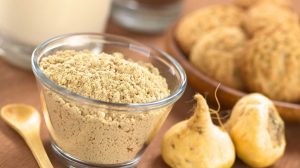Table of Contents
The benefits of all-natural supplements
All-natural supplements offer a variety of benefits over synthetic supplements. Here are some of the top reasons why all-natural supplements are the future of wellness:
| Category | Description |
|---|---|
| Higher nutrient levels | All-natural supplements contain vitamins, minerals, and other nutrients in their most natural and bioavailable forms. For example, vitamin C from acerola cherries is more readily absorbed than synthetic ascorbic acid. |
| Synergistic effects | Nutrients in all-natural supplements work together synergistically the way nature intended. For instance, vitamin E works better with vitamin C and selenium. |
| No artificial fillers | Natural supplements do not contain artificial colors, flavors, preservatives, binders, or other potentially harmful additives found in synthetic supplements. |
| Non-GMO | Reputable all-natural supplements are made from non-GMO ingredients grown without pesticides or herbicides. Synthetic nutrients often contain GMOs. |
| Digestive support | Natural supplements contain compounds that support healthy digestion and absorption, allowing your body to properly utilize the nutrients. |
| Detoxification | Herbal ingredients in all-natural supplements support the body’s natural detoxification processes. |
| Immune enhancement | Bioactive compounds in natural supplements boost immunity and help prevent illness. Vitamin C, ginger, and mushrooms are examples. |
| Cellular protection | Antioxidants from natural sources protect cells from oxidative damage caused by stress, pollution, and poor diet. |
| Hormone balancing | Adaptogenic herbs in all-natural supplements help modulate cortisol, estrogen, testosterone and other hormones. |
| Mental clarity | Natural nootropics like Bacopa monnieri and ginkgo biloba enhance memory, focus and cognition. |
Takeaway: Choosing all-natural over synthetic supplements provides whole body wellness benefits and long-term health promotion.

All-natural supplements are better than synthetic supplements
All-natural supplements have clear advantages over synthetic supplements for supporting wellness:
| Category | Description |
|---|---|
| Natural forms of nutrients | All-natural supplements contain vitamins, minerals and other nutrients in the same forms found in food rather than synthetic isolates. Natural vitamin E, for instance, consists of 4 tocopherols and tocotrienols with synergistic benefits, while synthetic vitamin E is just alpha-tocopherol. |
| Co-factors for absorption | Natural supplements provide the co-factors needed for nutrients to be properly absorbed and utilized. For example, vitamin C needs bioflavonoids, vitamin D requires vitamin K, and calcium needs vitamin D and magnesium. |
| No harsh manufacturing | Quality all-natural supplements are made using gentle extraction processes without excessive heat or pressure. Synthetic nutrients involve harsh manufacturing with acid solutions and solvents. |
| Plant-based ingredients | Herbal ingredients like ginger, turmeric, boswellia and ashwagandha have numerous medicinal properties. All-natural supplements harness the power of plants. |
| Supports detoxification | All-natural supplements aid the body’s detoxification systems including the liver, kidneys, digestive tract, skin and lungs. Chlorella, milk thistle and burdock root are examples. |
| Bolsters immunity | The vitamins, minerals, antioxidants and phytochemicals in all-natural supplements strengthen immune defenses against pathogens and prevent illness. |
| Protects against disease | Natural supplements help prevent chronic diseases including heart disease, diabetes, cancer and neurodegenerative conditions. Synthetic isolates do not offer the same benefits. |
| Regulates hormones | Adaptogenic herbs in all-natural supplements balance cortisol, insulin, estrogen, testosterone and other hormones for optimal wellness. |
| Environmentally sustainable | Quality all-natural supplements use sustainable farming practices and earth-friendly manufacturing processes. Synthetics supplements have a larger eco-footprint. |
Takeaway: For full-body health and wellness, all-natural supplements are a smarter choice than synthetic isolated nutrients.
How do all-natural supplements support overall wellness?
All-natural supplements support whole body wellness in a variety of ways:
| Category | Description |
|---|---|
| Optimize nutrition | High quality all-natural supplements fill nutritional gaps when diet alone falls short. Getting sufficient vitamins, minerals and antioxidants supports health. |
| Boost immunity | Nutrients like vitamin C, zinc, elderberry and medicinal mushrooms strengthen the immune system to resist illness. Adaptogens like ashwagandha also boost immunity. |
| Reduce inflammation | Curcumin, boswellia, bromelain and omega-3s in natural supplements decrease inflammation, which is the root of most diseases. |
| Support detoxification | Natural supplements aid detoxification through the liver, kidneys, lungs, lymphatic system and skin. Milk thistle, dandelion and glutathione are examples. |
| Improve digestion | Probiotics, digestive enzymes and botanicals in natural supplements enhance digestion and absorption of nutrients from foods. |
| Balance hormones | Adaptogenic herbs in supplements help regulate cortisol, insulin, estrogen, testosterone and thyroid hormones. Maca, ashwagandha, ginseng and rhodiola are adaptogens. |
| Enhance mental clarity | Natural nootropics including bacopa, ginkgo biloba and l-theanine sharpen focus, memory, learning and mental performance. |
| Promote healthy sleep | Herbs like valerian, chamomile, passionflower and hops support more restful sleep and circadian rhythms. |
| Protect cells | Antioxidants from whole food sources like acai berry and green tea neutralize free radicals and oxidative stress that damage cells. |
| Support energy | Nutrients like B vitamins, iron, magnesium, CoQ10 provide natural energy by fueling cellular metabolism. |
Takeaway: Choosing quality all-natural supplements covers all the bases for full mind-body wellness.
What makes an all-natural supplement different from a synthetic supplement?
There are some key differences between all-natural and synthetic dietary supplements:
| Category | Description |
|---|---|
| Source of nutrients | Natural supplements derive nutrients from whole food sources like fruits, vegetables, herbs and spices. Synthetic supplements contain lab-created isolated or synthetic nutrients. |
| Form of nutrients | Nutrients in natural supplements are in bioidentical forms that match those found in foods. Synthetic nutrients are often not in natural forms. For instance, natural vitamin E consists of all 8 tocopherols and tocotrienols. |
| Manufacturing process | Quality natural supplements use gentle extraction processes without heat or pressure. Synthetics involve harsh manufacturing using solvents and chemical reactions. |
| Additional compounds | Natural supplements contain a spectrum of beneficial plant compounds like polyphenols, terpenes and glycosides that work synergistically. Synthetics are just isolated nutrients. |
| GMO status | Reputable natural supplements are non-GMO and contain organic and sustainably grown ingredients. Synthetic nutrients often come from GMO sources like corn and soy. |
| Fillers and binders | Natural supplements may contain whole food powders or vegetable capsules. Synthetics contain artificial fillers, binders, colors and coating. |
| Absorption enhancers | Natural supplements include compounds that enhance the absorption and utilization of nutrients. Synthetics do not have these. |
| Toxicity | Some synthetic vitamins like vitamin A, B6 and folic acid in isolation can build up to toxic levels in the body when taken long term. Naturals are non-toxic. |
| Regulation | High quality natural supplement brands meet stringent standards for purity and potency. Oversight of synthetics can be more lenient. |
Takeaway: For true whole body wellness, all-natural supplements derived from nature are the ideal choice.
How can you tell if a supplement is truly all-natural?
With so many supplements touting “all-natural” claims, how can you be sure a product is genuinely natural? Here are some tips:
Here is the data you provided, organized into a table:
| Category | Description |
|---|---|
| Read the ingredient list | All ingredients should be from natural food, herb, spice or mineral sources, with no synthetic or chemical-sounding items. Watch for “isolate” or “acetate” which indicate a synthetic. |
| Research the brand | Investigate if the brand uses third-party testing to verify all-natural status and purity. Beware of brands that are vague about their quality control. |
| Look for certifications | High quality natural brands will have certifications like USDA organic, non-GMO project verified, or flag “No Artificial Ingredients”. Lack of certifications is a red flag. |
| Ask about processing | Reach out to the company and ask how their products are manufactured. Natural supplements use low temperatures, pressure and enzymatic processes. Avoid harsh solvents or chemical reactions. |
| Check for fillers | All-natural supplements shouldn’t contain gluten, soy, dairy, stearates, wax, titanium dioxide or artificial coloring. Steer clear of “proprietary blends”. |
| Consider capsule material | True natural supplements will use plant-based capsules, not gelatin. Vegicaps or cellulose capsules are ideal. |
| Know common replacements | Be aware that synthetic vitamin E (dl-alpha tocopherol), folic acid and vitamin D2 are often used in place of natural forms. |
| Spot check a few brands | Compare a few products side-by-side and look for differences in transparency, certifications, additives and ingredient sourcing. The superior quality will be obvious. |
Takeaway: With some diligent label reading and research, you can find truly all-natural supplements for optimal wellness. Trust reputable brands committed to natural integrity.
Are all-natural supplements regulated and tested for safety?
All-natural supplements are regulated, though not as strictly as pharmaceutical drugs. Here is how reputable natural supplement brands ensure safety and quality:
| Category | Description |
|---|---|
| FDA current Good Manufacturing Practices (cGMPs) | Companies must adhere to good manufacturing processes including safety, purity and potency testing. Third-party certification can verify cGMP compliance. |
| Independent lab testing | Responsible brands test raw materials and finished products in independent labs to ensure they are free from contaminants and match label claims. Certificates of analysis (COAs) confirm results. |
| Third-party audits | Brands can undergo voluntary audits from organizations like NSF, Informed Choice and UL to verify quality systems and product claims. These audits test for heavy metals, allergens, GMOs, pesticides and other contaminants. |
| Trade associations | Membership in trade associations like AHPA demonstrates a commitment to quality manufacturing and compliance within the natural products industry. |
| Truth in advertising | The FTC and FDA enforce truth in advertising laws. Companies must be able to substantiate any health or quality claims. False or misleading claims result in legal action. |
| Ingredient safety reviews | Reputable brands evaluate the safety of ingredients based on historical use, published research and toxicology data to ensure a wide margin of safety at recommended doses. |
| Post-market vigilance | Brands monitor adverse events reports and conduct additional testing to identify any issues not caught during initial product safety reviews. |
Takeaway: While not flawless, these measures help ensure all-natural supplements are properly regulated and tested for safety and quality when produced by ethical brands. Consumers should verify companies adhere to cGMPs and utilize third-party testing.
What ingredients should you look for in a quality all-natural supplement?
Choosing all-natural supplements with top-tier ingredients ensures maximum effectiveness. Here are some ideal ingredients to look for:
| Category | Description |
|---|---|
| Vitamins and minerals | Look for all-natural forms like vitamin C from acerola cherry, food-based B vitamins, and plant-sourced minerals like zinc picolinate or magnesium glycinate. Avoid synthetic isolates. |
| Herbal extracts | Potent herbal extracts like ashwagandha, milk thistle, turmeric, ginger, chamomile, and boswellia provide therapeutic plant compounds. Standardized extracts ensure consistent active ingredients. |
| Antioxidants | Natural antioxidants like resveratrol, elderberry, guava leaf extract, and sprouted rice neutralize damaging free radicals that accelerate aging. |
| Probiotics | Look for broad spectrum probiotic formulas with strains like Bacillus coagulans and Lactobacillus plantarum in the billions of CFUs. Avoid unnecessary fillers. |
| Digestive enzymes | Plant-based digestive enzymes derived from pineapple, papaya and fungi improve nutrient absorption. |
| Omega fatty acids | Cold water fish, flaxseed and algae provide vital omega-3 fats EPA and DHA for brain and heart health. |
| Amino acids | L-theanine, taurine and glycine are calming amino acids that enhance sleep, mood and cognition. |
| Prebiotics | Prebiotics like acacia fiber and inulin act as fuel for probiotic bacteria. |
| Mushrooms | Functional mushrooms like chaga, cordyceps, lion’s mane and reishi offer adaptogenic and immune enhancing benefits. |
| Fruit & vegetable blends | Whole food blends made from concentrated fruits, veggies, greens, berries and seeds offer a micro-nutrient boost. |
How do all-natural supplements boost immunity and prevent disease?
All-natural supplements strengthen your immune system and prevent disease through several mechanisms:
| Nutrient/Compound | Description |
|---|---|
| Vitamins A, C, D, E and zinc | These essential vitamins and minerals support healthy immune cell function and antibody production. Deficiencies impair immunity. |
| Medicinal mushrooms | Compounds from reishi, shiitake, maitake and cordyceps mushrooms enhance immune cell activity including natural killer cells, macrophages and T-cells. |
| Probiotics | Beneficial bacteria like Lactobacillus acidophilus populate the gut microbiome and train the immune system. Some produce antimicrobial compounds. |
| Adaptogens | Herbs like ashwagandha, rhodiola and ginseng regulate cortisol and reduce inflammation, preventing chronic disease. |
| Polyphenols | Powerful plant compounds from green tea, berries, curcumin and grapes neutralize harmful free radicals that can damage cells and lead to cancer. |
| Carotenoids | Phytonutrients like lycopene and lutein from fruits and vegetables boost antioxidant activity in immune cells. |
| Omega-3 fatty acids | EPA and DHA from fish oil support healthy inflammation pathways in the immune system and suppress autoimmunity. |
| Prebiotics | Prebiotic fibers act as fertilizer for probiotics to flourish, enhancing microbiome balance and gut barrier defenses. |
| Bioactive peptides | Peptide compounds derived from plants promote immune cell regeneration, activity and growth factors. |
| Antimicrobial botanicals | Herbs like garlic, olive leaf, astragalus, echinacea, elderberry have natural antibacterial and antiviral properties. |
Takeaway: Stock your medicine cabinet with all-natural supplements to robustly support your immune system function and defend against disease causing pathogens and free radical damage.
Are all-natural supplements right for me?
All-natural supplements can be an excellent addition to your routine when chosen wisely. Here are some factors to consider:
- Individual needs: Assess your diet, lifestyle, health conditions, age and gender to determine specific nutritional gaps or wellness goals that may benefit from natural supplementation. Consult a healthcare provider if needed.
- Quality over quantity: Focus on a few high quality, potent all-natural supplements that target your needs rather than dozens of mediocre products. Quality over quantity.
- Read the labels: Scrutinize ingredients, certifications (organic, non-GMO), manufacturing processes and origin of ingredients to choose products with integrity. Avoid unnecessary fillers.
- Start low, go slow: Begin supplements at low doses and gradually increase over weeks. This helps gauge tolerance and effectiveness.
- Timing matters: Take supplements at optimal times such as vitamin D and magnesium before bed or B vitamins in the morning for energy.
- Rotate as needed: For some supplements, cycling on and off or periodically rotating products can be beneficial to get a variety of nutrients.
- Pair with lifestyle practices: All-natural supplements work best alongside a healthy diet, stress management, physical activity, social connection and other wellness habits.
- Watch for reactions: Discontinue use if any adverse reactions occur and consult your healthcare provider.
With careful selection and responsible use, adding a few choice all-natural supplements can provide a safe yet potent boost on your wellness journey when diet alone falls short.
Key Takeaways
- All-natural supplements derived from food, mineral and herb sources offer more complete, safe and effective nutrition than synthetic isolates.
- Natural vitamins, antioxidants, botanicals and other nutrients found in quality supplements support whole body wellness in numerous ways from reducing inflammation to enhancing immunity.
- Look for products with third-party testing and certifications to ensure true all-natural status without contaminants or unwanted synthetic additives.
- Choosing evidence-based ingredients like probiotics, curcumin, Omega-3s and adaptogens provides assurance of efficacy for specific wellness goals.
- Responsible use of a select few high quality, all-natural supplements can complement other positive lifestyle habits to optimize wellness and protect against disease. But safety, quality and transparent sourcing is paramount when selecting supplements.
Conclusions
All-natural supplements provide a number of advantages over synthetic supplements when it comes to supporting whole body wellness. Sourced from nature in their most bioavailable and bioavailable forms, all-natural vitamins, minerals, antioxidants, probiotics, adaptogens, and other beneficial compounds work synergistically to optimize nutrition, reduce inflammation, support detoxification, balance hormones, enhance mental performance, boost immunity and more. However, not all products touting “natural” claims live up to their marketing. Scrutinizing manufacturing processes, purity testing, ingredient sourcing, certifications, and overall brand transparency helps discern high quality all-natural supplements that deliver on their promises. When chosen wisely based on individual needs and used responsibly alongside other positive lifestyle habits, adding a few select all-natural supplements to one’s routine can be a safe, effective way to defend against disease, counteract nutritional deficiencies, and attain full mind-body wellness. The future points toward natural supplements over synthetic for optimal health promotion.
Here are some key conclusions about why all-natural supplements are the future of wellness:
- All-natural supplements provide vitamins, minerals, and nutrients in their most bioavailable and synergistic forms, as nature intended.
- Natural supplements boost immunity, reduce inflammation, support detoxification, balance hormones, enhance cognition and promote overall wellness better than synthetic isolates.
- Quality manufacturing, purity testing, ingredient sourcing, and certifications help identify authentic all-natural products for optimal safety and potency.
- Choosing evidence-based natural ingredients provides efficacy for specific wellness goals like probiotics for gut health or adaptogens for stress.
- When used responsibly, select all-natural supplements complement healthy lifestyle practices for comprehensive mind-body wellness and disease prevention.
- For true safety and effectiveness, the future points toward all-natural over synthetic dietary supplements to achieve peak vitality.
Frequently Asked Questions
Are all-natural supplements safe?
A supplement’s “all-natural” designation does not guarantee its safety or efficacy. Read through the list of frequently asked questions before purchasing any supplements to make sure the product will benefit rather than hurt your health. Based on your current diet and health, ask your doctor if you need the supplement. Inquire about the supplement’s potential advantages and drawbacks as well as how much and for how long you should take it.
What should I look for when buying all-natural supplements?
When purchasing all-natural supplements, seek out items that have undergone independent testing from agencies like NSF International or USP. These organizations carry out quality, potency, and purity checks for supplements. Make sure the supplement doesn’t contain any dangerous additives or fillers and check the label for the amount of active ingredients per serving.
How do I know if a supplement is effective?
Although there are no assurances that a supplement will work, you might look for goods that have undergone clinical testing. Look for studies that back up any effectiveness claims on the label and check them out. The quality and efficacy of supplements might vary greatly because they are not subject to the same FDA regulations as medications.
Are there any risks associated with taking all-natural supplements?
Yes, using all-natural vitamins does include some risk. Some supplements can mix with other supplements or prescription drugs, while others can have unfavorable effects or trigger allergic responses. Before using any dietary supplement, it’s crucial to speak with your doctor, especially if you use any prescription medications, other dietary supplements, or if you have any medical issues.
Resources
Here are some external sources that provide valuable insights into the world of natural supplements:
- The Truth About Supplements: This article from Penn Medicine delves into the realities of dietary supplements, discussing their forms, effectiveness, safety considerations, and the importance of consulting with healthcare professionals. It emphasizes that while some supplements can be beneficial, they should not replace a nutrient-rich diet. The article also highlights the potential risks associated with certain supplements and the importance of being cautious and informed. Read more here.
- Should You Take Dietary Supplements?: An article from NIH News in Health that discusses the popularity of nutrient supplements, particularly multivitamins, calcium, and vitamins B, C, and D. It touches upon their benefits and the considerations one should keep in mind before incorporating them into their daily regimen. Read more here.
- What You Need to Know – Consumer: This resource from the NIH Office of Dietary Supplements provides consumers with essential information about various supplements, their benefits, and potential risks. It’s a comprehensive guide that can help individuals make informed decisions about their supplement intake. Read more here.
- Synthetic vs. Natural Nutrients: Does it Matter?: Healthline explores the debate between synthetic and natural nutrients, discussing the health benefits of nutrients in whole foods and how they can help manage and prevent various diseases. Read more here.
These sources offer a wealth of information and can serve as a starting point for anyone looking to delve deeper into the world of natural supplements and make informed choices for their health and well-being.
For those interested in exploring a curated selection of natural supplements, you can visit Herbal Pitstop’s online store to discover a range of high-quality products tailored for holistic well-being.




